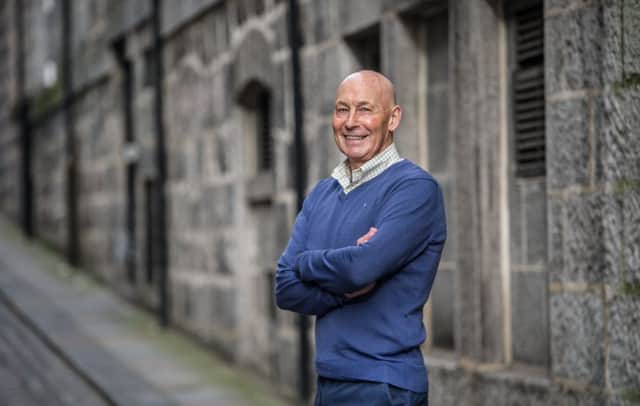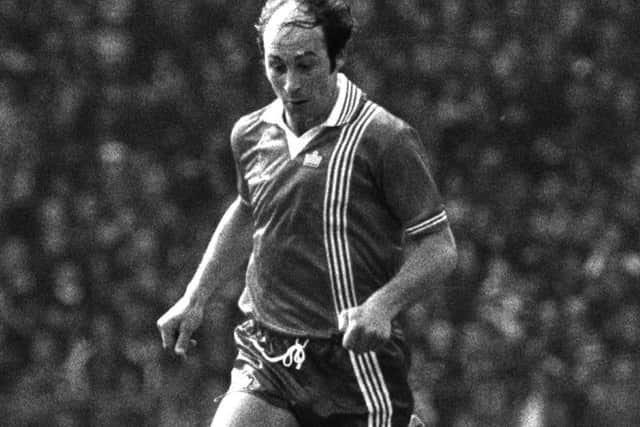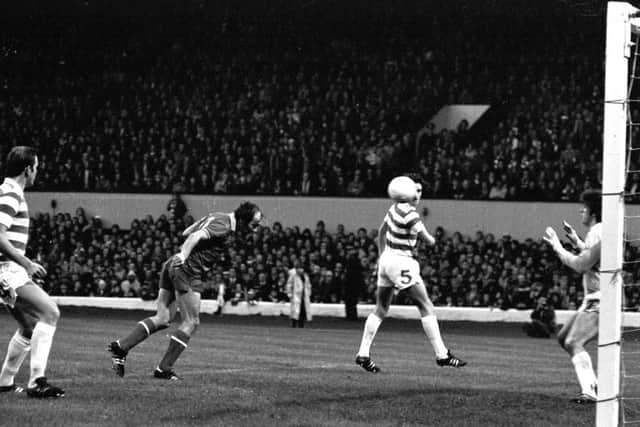Interview: Drew Jarvie on his heady days with Aberdeen


You remember the cards: images gathered in pre-season sunshine, corrugated-roof stands forming the backdrops with maybe a hunk of industrial Scotland beyond them, and the subjects grimacing hopefully for the campaign ahead. If Jarvie was self-conscious he might have peered at the lens and wondered: “What’s my hair like?” But he wasn’t, not at all.
“I wanted to get it all cut off,” he says of his famously flyaway barnet, “but my wife and my daughter wouldn’t let me. ‘Och it’s fine,’ they said. When I look back at old photos now I just laugh.”
Advertisement
Hide AdAdvertisement
Hide AdFirst at Airdrieonians, where he won Scotland caps, and then Aberdeen where he scooped honours, that hair, what there was of it, hardly held Jarvie back. Gusty days would play havoc with his locks. “Montrose, Brechin,” he says, listing the trickiest venues, and maybe St Johnstone legend Henry Hall would like to chip in here. “Pittodrie was no help to me with that wee wind-tunnel down in the corner. But Arbroath right next to the sea was always horrendous – the worst.”


The bald or balding footballer may be close to extinction with today’s players able to spend small fortunes on weaves. In recognition of a dying breed, a newspaper recently assembled a great baldies XI and Jarvie was included alongside Zinedine Zidane, Fabien Barthez and Bulgaria’s Yordan Letchkov.
“Och mine’s was a comb-over,” he continues, “just like Bobby Charlton and Ralph Coates of Spurs, who I played against for Aberdeen in the Uefa Cup.” Does he wish thatch-thickening treatments had been around in his day? He shakes his now completely hairless head then adds: “I admit to some vanity: I tried a wee spray to keep the strands in place but it never worked. [Dons team-mate] Neale Cooper used to say: ‘Drew wasn’t offside but his hair was.’”
The only time Jarvie was sent off in his 20-year career his gleaming pate was involved. “I clattered into Hamish McAlpine of Dundee United and Alex Rennie grabbed me round the neck, kind of playfully, and said: ‘You shouldn’t have done that, you baldy bastard.’ So I gave him a dunt as well.”
The chant of “Baldy, Baldy” – hardly the terracings at their most witty or profound – used to echo round away grounds for Jarvie. “Parkhead and Ibrox were obviously the loudest but it didn’t bother me.” Indeed, with Sir Alex Ferguson urging his Aberdeen players to be brave in Glasgow in season 1979-80, Jarvie scored late to grab a vital point at Rangers in the championship run-in and a fortnight later, with the Jungle in full cry, put the Dons on the road to victory at Celtic Park. Soon after, the first title of the glorious era would be red-hued.


I meet Jarvie, now 68, for a coffee in Aberdeen where he lives with his wife Janette. After coming through a heart scare a few years ago – an operation was required to replace a valve – he’s looking well on grandfatherly duties and golf, even if he had been relieved of a few quid by Joe Harper on the links the previous day.
These two were strike partners and 40 years ago they combined deftly for Aberdeen’s League Cup triumph. Yesterday wee Joe, not much bigger than Drew and the rest of the side, minus the late manager Ally MacLeod, Oz-exiled substitute and “Pele of the North” George Campbell, and a couple of others who couldn’t make it, gathered in the city’s Chester Hotel for a charity lunch to reminisce about a notable victory.
The groundwork for the Fergie Years was laid in ’76. Half the team from the 2-1 extra-time win over Celtic would go on to help Sir Alex to his first big prize. That was a League Cup won before Christmas and a re-vamping of the competition format is giving Aberdeen the chance to do it again, once more against Celtic. Before the 27 November showdown, there’s a dress rehearsal in the league this lunchtime.
Advertisement
Hide AdAdvertisement
Hide AdThe ’76 final is memorable for MacLeod’s skippety-skip celebration in his powder-blue suit and maybe the ugliest cup-winning goal, courtesy of Davie Robb, that Hampden has ever seen. Before then, Jarvie had been heavily involved, first giving away the penalty with which Jock Stein’s team took the lead. “Kenny Dalglish tried to roll me with that big backside of his and fell over my leg. It was never a penalty.”


Jarvie redeemed himself with the equaliser when a raking Arthur Graham cross to the back post found Harper who headed back for our man to nod home. “To this day Joe says: ‘I knew you’d be rushing into the box’.” The goal monster revered by the Beach End possessed a fine football brain. “So did Jocky Scott, my other great friend in the team.” Jarvie, it should be said, wasn’t lacking cleverness himself.
Celtic, he admits, “battered” the Dons for the remainder of extra-time. “We were fortunate that all their chances fell to Danny McGrain who slipped them by the far post.” Back in the Granite City an open-topped bus paraded along Union Street with a weel-kent face leading the way. “Hermit – Jim Hermiston – had been a fine player for us but, with a family coming along, he decided to join the police. It was good to have him with us that day.”
Jarvie hails from Annathill in Lanarkshire, which was a tiny mining village of just three streets when he was growing up. “All the men worked down the local colliery, the Bedlay. My dad aye said, ‘I must take you down the pit one day,’ but he never did. He didn’t want me to become a miner, though. I think his generation realised it wasn’t a career for young lads. He sometimes did ‘doublers’, one eight-hour shift followed by another, and when he came back up he’d be spitting coal dust. That’s what killed a lot of these guys in the end.”
I make the mistake of assuming that Jarvie, capped three times in 1971 as a part-time footballer, is Annathill’s most famous son. “Oh no,” he says, “Bobby Flavell and Frank Brennan went from the village to playing for Scotland.” Brennan was on Airdrie’s books during the Second World War, clocked up more than 300 games for Newcastle United and coached as far afield as Singapore and Trinidad. Flavell, another ex-Diamond, was even more exotic, playing alongside Alfredo Di Stefano in a pirate 1950s Colombian league bankrolled by cattle barons before returning to Scotland in semi-disgrace, eventually being taken in by Dundee where his goals helped win two League Cups.


Life in Annathill was spartan for young Jarvie. “There was a sweetie shop across from the school but we had to share an outside loo with our neighbours. And most times there was only one ball to go round the whole village. Everyone would play, including the dads but, when it burst, the game was a bogey. I remember once I had the only ball and older boys would pay me tuppence for a shot of it.”
After starring as a junior, Jarvie, an auto electrician to trade, signed for Airdrie with a Broomfield legend playing a fulsome part in his five years at the club. “Ian McMillan scouted me, reported for TV on my debut in the New Year’s Day derby against Motherwell when I scored two goals, managed me and paired me up front with Drew Busby – then sold me to Aberdeen for £72,000.” The double-Drew partnership was highly productive. “My namesake was strong and bustling and great to play alongside, although I must admit when he charged in on goalkeepers I used to close my eyes. I don’t see so much of him these days although we exchange Christmas cards and when I was recovering in hospital from my operation he was straight in to see me.”
Jarvie’s health scare prompted loads of “Get well soon” messages on Diamonds fansites and supporters were soon recalling the exploits of rummle-them-up Busby and his more artistically-inclined sidekick. “One season we scored 24 goals each. From a part-time team like Airdrie that was good going.” This was 1970-71 when a Texaco Cup place was clinched on goal difference, Jarvie netting the crucial counter in a 7-1 win over a Falkirk side containing A. Ferguson at centre-forward.
Advertisement
Hide AdAdvertisement
Hide AdAirdrie went all the way to the final, a four-goal Jarvie blitz against Huddersfield Town being the highlight of the run. “To win the cup we had to beat Brian Clough’s Derby County. It was nil-nil after the first leg at Broomfield but we were still confident. Then Derby called off the return late in the day because of a waterlogged pitch. We thought they treated us poorly as our fans were already well down the road. When it was eventually played Drew clattered their goalie and a few minutes later I got the retaliation – a punch in the face. Unfortunately we lost 2-1.”
Jarvie’s trio of international call-ups came in quick succession, all of them from the bench, three defeats. The first was away to Portugal in a European Championship qualifier. “Eusebio was playing for them and scored. I was a bit overawed.” Next up, George Best and Northern Ireland at Hampden followed by Bobby Moore’s England at Wembley. “I only got the last eight minutes of that one, by which time we were 3-1 down. Maybe I wondered what the fans thought about this No 19 from Airdrie hoping he could save the day. I’d have liked more chances with Scotland but if I’m honest I always thought I lacked a yard of pace. I was proud to play for my country, another feather in the cap of Annathill.”
Jarvie was brought to Pittodrie by Jimmy Bonthrone, who made another key signing in Jocky Scott but had to cope with the high-profile departures of Harper, Martin Buchan, Stevie Murray and Willie Young’s notorious walk-out when he flung his shirt at the manager. The fall-out overwhelmed a boss Jarvie regarded as “maybe too nice a guy”.
The loss of Harper in particular caused a deep depression among Dons fans and Jarvie, charged with making up the goals shortfall, sometimes had to endure their grumpiness. But Ally MacLeod was able to bring back the hero, endearing the new manager to the demanding support.
Jarvie says MacLeod’s ebullience boosted not just the team but the entire city. Playing for Aberdeen became fun. Playing as part of a midfield two became a challenge because the side were so attack-minded. The best demonstration of this was the semi-final of the ’76 League Cup when Rangers were hammered 5-1. “Jocky got a great hat-trick but, as I like to remind my pal, Archie Macpherson called my goal the best of the night.” When MacLeod quit to take charge of Scotland, Jarvie tried to put aside his personal disappointment as it would be good for the nation. Understandably, then, he felt for his old boss in the wake of Argentina. “I was terribly sorry for him and thought the experienced players let him down.” Each of Jarvie’s managers improved the Dons. To MacLeod’s Stewart Kennedy and Dom Sullivan, Billy McNeill added Gordon Strachan and Steve Archibald and made the Dons runners-up in the Premier League and Scottish Cup. All the guys in charge appreciated Jarvie’s worth.
His best-ever goal? Proud of the one against Rangers, a thumping drive from the edge of the box, he also submits for consideration a flashing header against Gunter Netzer’s Borussia Mönchengladbach. But, not caring about the glamour deficiency, his hat-trick for Airdrie against Ballymena United in the Texaco, played at Stranraer because of Northern Ireland’s Troubles, was pretty special, as was the last of his four for the Diamonds with Cowdenbeath the opposition.
No doubt, though, about his hottest goal streak. In the title season, young guns like John McMaster and Andy Watson forced their way into the Aberdeen team, as did the enigmatic Ian Scanlon. “That’s the word for Scan,” says Jarvie. “I ask Joe now: ‘Heard from him recently?’ No one has.” The man with the shiny napper was occasionally asked to make way for the new boys and although this was frustrating for him, it now looks like another Fergie masterstroke.
“I guess he was saving my wee legs. Against Partick Thistle at the beginning of March I got our equaliser and couldn’t stop scoring after that.” Before Ferguson had coined the phrase “squeaky-bum time”, Aberdeen made light of the tension and Jarvie became the trump-card. Climaxing in the goal at Parkhead which silenced “Baldy, Baldy”, he netted in seven out of eight crucial games. “It should have been eight out of eight. I was rested at Kilmarnock, came on and missed a chance right at the end.” Surely, though, Drew Jarvie could have been no more than a hair’s breadth away.